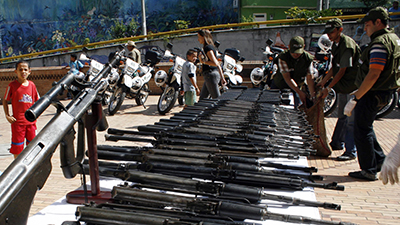Next to the mayor’s office in the northern Colombian town of Caucasia sits a monument to government dysfunction: a half-built public library with broken windows, a water-stained floor, and rusting reinforcement rods protruding from concrete pillars.
According to news reports, construction mysteriously ground to a halt after the town government spent about a million dollars on the project. But when local journalist Rober Nieto recently tried to investigate, a town official warned him to back off.
Such threats are taken seriously by journalists in Caucasia and other towns in northern Antioquia department. The area swarms with former paramilitaries who have formed criminal gangs–known in Spanish as bandas criminales, or simply bacrim–that traffic drugs and extort businesses. The bacrim often work in cahoots with local politicians, and when journalists dig into issues like government corruption, they sometimes receive threats from the bacrim.
“We can register events, but investigative journalism is off limits,” Nieto, editor of Región al Día, a monthly newspaper in Caucasia, told CPJ. “We need to have good journalism, but it’s dangerous to write about alliances between local authorities and the bacrim.”
According to the Bogotá-based Foundation for Press Freedom, or FLIP, Antioquia is one of the most dangerous regions of Colombia for journalists. Besides the bacrim, two Marxist guerrilla groups roam parts of the department. Since 2009, FLIP has registered 31 threats against reporters. During this period, two journalists were forced to flee the region.
The result has been a virtual blackout of in-depth news coverage in parts of Antioquia. Many reporters in Caucasia and nearby towns say they can inform the public about what is going on but get into trouble when they try to explain why.
For example, Oscar Martínez, director of the Caucasia Stereo radio station, said he used to report on alleged ties between public officials–including the police–and the bacrim. But following a 2011 grenade attack on the station that was followed by extortion threats, he stopped reporting on these issues.
“We used to cover everything,” Martínez said. “I like to report when the mayor is not doing things right. But it’s dangerous.”
The situation is even more difficult in the nearby town of Tarazá where both bacrim and FARC guerrillas operate. Luis Carlos Cervantes used to direct the town’s only local news program on the Morena FM radio station. It wasn’t exactly All Things Considered–the program consisted of Cervantes condensing newspaper stories and making public service announcements.
“We would just read the newspapers on the program,” Cervantes told CPJ in an interview at the Morena FM studio, which is located on the Tarazá town square. “But now we can’t even do that.”
Indeed, the content sometimes included Colombian army and police bulletins as well as stories about the bacrim and the guerrillas–who apparently didn’t like the program and began sending Cervantes death threats on his cell phone. After receiving seven of these threats, Cervantes pulled the plug on the news program late last year and now the radio station plays only music.
One of the few remaining combative journalists in the region is Leiderman Ortiz, editor of La Verdad del Pueblo, a monthly newspaper in Caucasia that focuses on crime and corruption.
Ortiz, a former mayoral candidate who plans to run for office again, is something of a crusader. In the latest edition of La Verdad del Pueblo, he published an insert of a “wanted” poster of an alleged bacrim member accused of extortion. But instead of recommending that readers alert the police if they had any information, the poster urged them to call Ortiz and included his cell phone number and email address.
But Ortiz has paid a high price for his stance. In 2010, a grenade was thrown at his house and he later received two telephone death threats from alleged members of the bacrim. He is now accompanied 24 hours a day by two government bodyguards.
In interviews with CPJ, police officials in both Caucasia and Tarazá admitted that the bacrim continue to smuggle drugs and extort local businesses. But they denied that journalists face any special problems. When asked to rate press freedom on a scale of 1 to 10–with 10 being the highest–Caucasia Police Commander Alvaro Cardoso gave the town a 10.
A similar assessment was provided by Caucasia Mayor José Nadín Arabia, whose office window provides a panoramic view of the half-finished library. Arabia said the project was carried out by his predecessor and professed no knowledge of Nieto’s problems in trying to investigate what went wrong.
Except for Ortiz, Arabia said, he hadn’t heard of any recent threats against journalists. However, he admitted that reporters had toned down their coverage.
“The bacrim pressure everyone who writes negative things about them,” Arabia said. “But reporters no longer publish much about the bacrim.”
[Reporting from Caucasia, Colombia]
